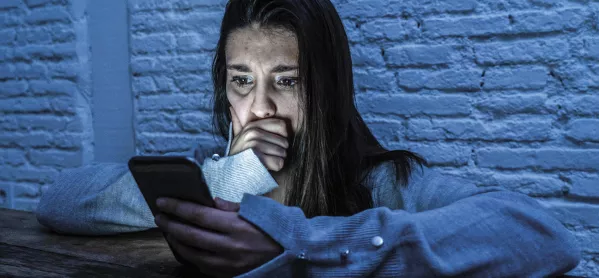Teachers can’t solve pupil porn problem alone, says DfE

Education secretary Gavin Williamson has written to the children’s commissioner asking how schools can be helped to tackle children’s access to online pornography, stating that “schools alone” cannot solve the problem of sexual misconduct and harassment by pupils.
The letter to Dame Rachel de Souza, jointly signed by culture secretary Oliver Dowden, was written in response to testimonies of harassment in schools posted on the Everyone’s Invited website, and says that “the government and our departments are committed to tackling this problem robustly wherever it arises”.
The move comes after Tes findings last week revealed deep concerns around pupils’ sexual conduct at both primary and secondary schools.
Revealed: ‘Alarming’ pupil sex misconduct in primaries
Sex abuse in schools: Half of teachers need more help on pupil sexual conduct
Related: Exclusive: Rape and revenge porn among secondary students
Today’s letter states that the government has established a helpline in partnership with the NSPCC, as well as commissioning Ofsted to conduct a review into sexual abuse within schools. It is “also considering what else may be needed in this space”, it says.
The impact of porn on school students
The letter adds: “However, we recognise that schools, colleges and universities alone cannot solve this problem. There are wider societal and cultural issues at play.
“In particular, a large amount of pornography is available on the internet with little or no protection to ensure that those accessing it are old enough to do so. This, in turn, is changing the way young people understand healthy relationships, sex and consent.
“While being online can be a hugely positive experience for children and young people, there is growing concern about the impact of exposure to harmful or inappropriate content, such as pornography.”
A recent Tes survey found that many teachers were concerned about children’s access to online pornography. In secondary schools, more than a third of secondary staff surveyed were aware of incidents involving children watching or circulating pornography (38 per cent).
Other sexual misconduct by students that secondary school staff responding to the survey had come across in the past year at their school included requests for naked pictures (35 per cent), revenge porn and sharing of private sexual images without consent (29 per cent) and “upskirting” (14 per cent).
Meanwhile, one in three primary school staff had come across at least one instance of sexual harassment or misconduct involving pupils at their school in the past year, with one state primary teacher reporting that “generally misogynistic” behaviour amongst older primary pupils stemmed from “watching on-demand online videos”.
In today’s letter, the culture and education secretaries say they would “welcome” Dame Rachel’s views on “how to work with schools, parents and charities to support them around building strong social norms against underage access to pornography, around children using the internet safely and educating those groups on the impact that some internet content can have on healthy sex and relationships”.
Mr Williamson said the government planned to “make the UK the safest place to be a child online”.
“A key part of this is a ground-breaking new system of accountability and oversight of tech companies that will be enshrined in law through the Online Safety Bill, which the government published this week,” he added.
The education secretary said that internet companies would need to prevent children from accessing online pornography, as well as minimise pupils’ exposure to bullying behaviour. Companies that failed to do so would face huge fines or a possible ban from the UK.
Mr Williamson invited Dame Rachel to a roundtable discussion with tech companies on what measures could be taken to further protect children when the Online Safety Bill comes into effect.
The children’s commissioner has been contacted for comment.
You need a Tes subscription to read this article
Subscribe now to read this article and get other subscriber-only content:
- Unlimited access to all Tes magazine content
- Exclusive subscriber-only stories
- Award-winning email newsletters
Already a subscriber? Log in
You need a subscription to read this article
Subscribe now to read this article and get other subscriber-only content, including:
- Unlimited access to all Tes magazine content
- Exclusive subscriber-only stories
- Award-winning email newsletters
topics in this article



